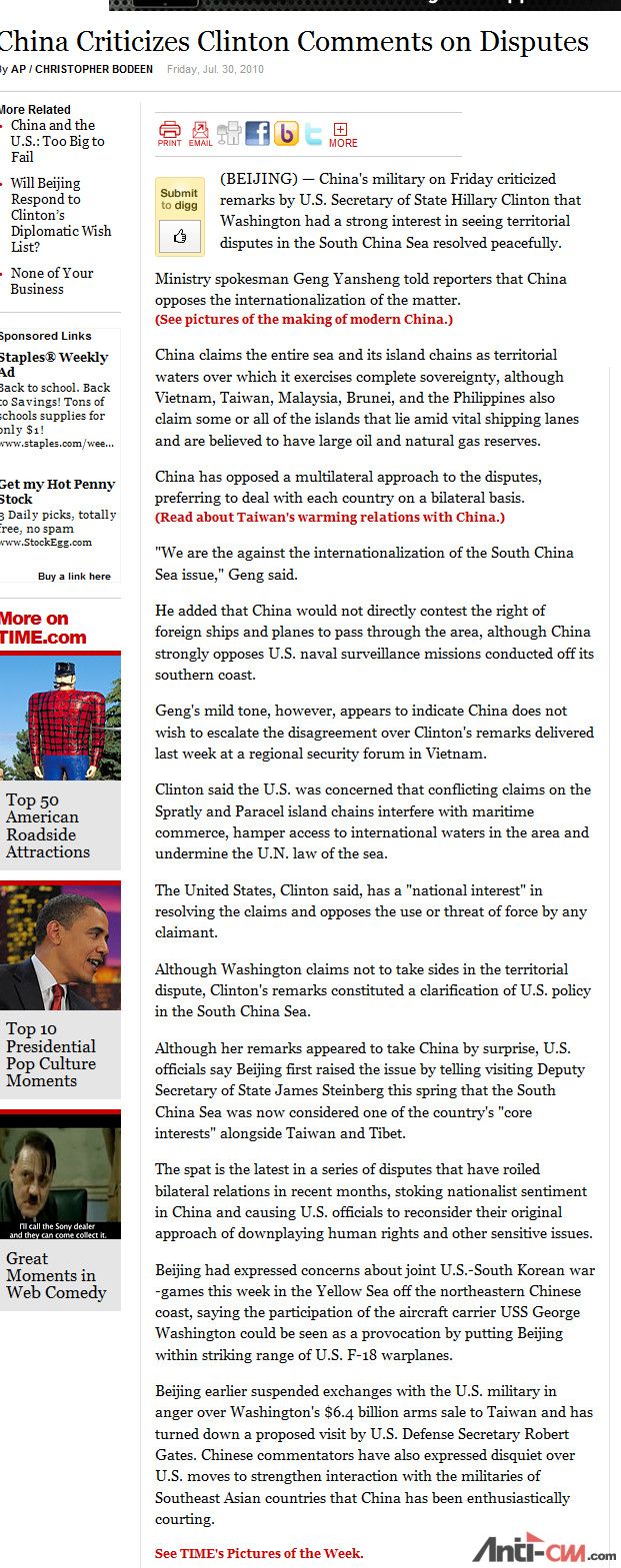(BEIJING) — China's military on Friday criticized remarks by U.S. Secretary of State Hillary Clinton that Washington had a strong interest in seeing territorial disputes in the South China Sea resolved peacefully.
Ministry spokesman Geng Yansheng told reporters that China opposes the internationalization of the matter. (See pictures of the making of modern China.)
China claims the entire sea and its island chains as territorial waters over which it exercises complete sovereignty, although Vietnam, Taiwan, Malaysia, Brunei, and the Philippines also claim some or all of the islands that lie amid vital shipping lanes and are believed to have large oil and natural gas reserves.
China has opposed a multilateral approach to the disputes, preferring to deal with each country on a bilateral basis.
(Read about Taiwan's warming relations with China.)
"We are the against the internationalization of the South China Sea issue," Geng said.
He added that China would not directly contest the right of foreign ships and planes to pass through the area, although China strongly opposes U.S. naval surveillance missions conducted off its southern coast.
Geng's mild tone, however, appears to indicate China does not wish to escalate the disagreement over Clinton's remarks delivered last week at a regional security forum in Vietnam.
Clinton said the U.S. was concerned that conflicting claims on the Spratly and Paracel island chains interfere with maritime commerce, hamper access to international waters in the area and undermine the U.N. law of the sea.
The United States, Clinton said, has a "national interest" in resolving the claims and opposes the use or threat of force by any claimant.
Although Washington claims not to take sides in the territorial dispute, Clinton's remarks constituted a clarification of U.S. policy in the South China Sea.
Although her remarks appeared to take China by surprise, U.S. officials say Beijing first raised the issue by telling visiting Deputy Secretary of State James Steinberg this spring that the South China Sea was now considered one of the country's "core interests" alongside Taiwan and Tibet.
The spat is the latest in a series of disputes that have roiled bilateral relations in recent months, stoking nationalist sentiment in China and causing U.S. officials to reconsider their original approach of downplaying human rights and other sensitive issues.
Beijing had expressed concerns about joint U.S.-South Korean war-games this week in the Yellow Sea off the northeastern Chinese coast, saying the participation of the aircraft carrier USS George Washington could be seen as a provocation by putting Beijing within striking range of U.S. F-18 warplanes.
Beijing earlier suspended exchanges with the U.S. military in anger over Washington's $6.4 billion arms sale to Taiwan and has turned down a proposed visit by U.S. Defense Secretary Robert Gates. Chinese commentators have also expressed disquiet over U.S. moves to strengthen interaction with the militaries of Southeast Asian countries that China has been enthusiastically courting.
 http://www.time.com/time/world/article/0,8599,2007607,00.html
http://www.time.com/time/world/article/0,8599,2007607,00.html